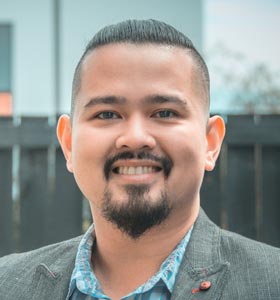
He is one of three new Nursing Council members elected recently but will keep advocating for Filipino nurses trying to reach New Zealand.
Manu Pelayo was seven when his older sister Suzette became severely ill. Having had measles as a baby, by nine she was developing neurological symptoms including loss of balance and speech. Diagnosed with subacute sclerosing panencephalitis – progressive brain inflammation, a rare side-effect of the particular measles strain – she spent the next 14 years bedridden at home, cared for by her family. “She was in bed, doing nothing but breathing really,” Pelayo remembers. “Mum was her full-time carer and the house basically became a hospital.”
From 10, Pelayo began helping with personal cares, tube-feeding, oral suctioning – “all sorts of nursing work”– at home, guided by his mum and uncle, a nurse. The care was so good, that despite being bedridden, “in 14 years, she never developed bedsores”, Pelayo recalls. “This was my main motivation for becoming a nurse. It was just the most sensible path for me, and it’s my calling.”
Suzette died shortly after Pelayo graduated and registered as a nurse. While she couldn’t communicate, Pelayo believes she knew what he had achieved.
After two years at Manila Doctors Hospital, in 2009 Pelayo responded to a Philippines’ recruitment drive from Counties Manukau District Health Board (CMDHB). He was interviewed in Manila by CMDHB staff and hired to work in the orthopaedic wards – once he’d completed the competency assessment programme (CAP) and met Nursing Council requirements.
CMDHB paid for his flights and accommodation while he was completing his CAP and guaranteed him a job – but things are more difficult now.
In the Philippines, jobs are few, hours are long and the pay for qualified nurses low (NZ$200-400 a month). For many, nursing overseas is an escape from poverty, and a way to provide for families.
Today, Filipino nurses wishing to emigrate have to go it alone, or pay consultants – who can be unscrupulous. “Expenses can be huge, with the CAP course then they also have to look for jobs themselves plus consultancy fees – it’s really hard.”
Pelayo is part of a small network advocating for those Filipino nurses, and countering “misinformation” spread by consultants and even media advising nurses to take the student visa pathway into New Zealand. But signing up for unnecessary “health management” courses can be the longest and most expensive route. “It’s a legal pathway but I don’t think it’s ethical for agencies to make their money from vulnerable people this way,” he said.
“When you hear something too good to be true and you are desperate to leave the country, you will grab anything.”
Petition
In 2018, he started a petition to stop student trafficking. Drawing more than 3000 signatures, the petition protested that media outlets in the Philippines were promoting false information about student schemes being the best way into New Zealand, when “it costs our fellow Filipinos an arm and a leg (maybe a kidney too) to pay the consultancy firms, pay for tuition at an international student rate and there is no guarantee that they will acquire a job afterwards or be offered a work or resident visa.”
The petition drew support and attention from the Filipino community and embassy in New Zealand, which is now in talks with different government agencies over the situation.
‘If I see an injustice, I’ll call it out.’
For Pelayo – a busy dad of three – it was unconscionable. “If I see an injustice, I’ll call it out. Some people think, ‘I’m settled here, why meddle in other people’s lives’, but obviously as an advocate for the profession, I’d like them to be able to come here and work as nurses.”
He advises nurses to apply for work directly, after gaining at least two years’ experience in the Philippines, then organise their own CAP and competency assessment at the Nursing Council.
Since orthopaedics, Pelayo has worked in critical care and private hospitals. At Middlemore’s intensive care unit he led an initiative on delirium sedation and pain relief, sparking a love of leadership.
He became involved with establishing a new “winter ward” at Middlemore Hospital in 2018, leading the development of a new model of care. The experience was “exhilarating” but, when the ward closed within a year, found it “heart-breaking” to see the close team dispersed.
He has since moved on – first to building project management at the DHB, then to community health provider, Healthcare New Zealand, where he is now regional clinical leader for the Northern and Midland regions. Seeing how much health care takes place in the community has been an “eye-opener”.




